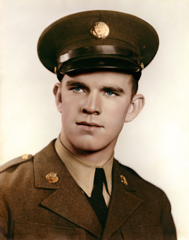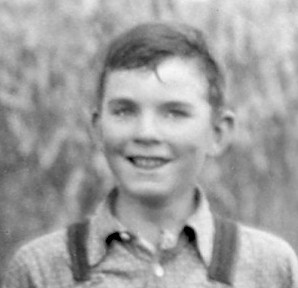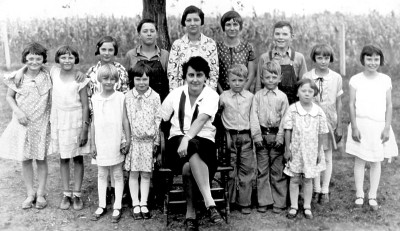

Taken from the 1981 Gray Centennial book
Dale E. Christensen was born May 31, 1920, the son of Chris and Sadie (Forsbeck) Christensen.
He enlisted in the U.S. Medical Corps in October of 1940 and was stationed at Fort McArthur, San Pedro, California. In 1941 he went to medical school in
Rockford, Illinois, then was transferred to Camp Callan, California. In April 1942, he was sent to Australia to school.
He was commissioned a Lieutenant in 1943 and served overseas in Australia, New Britain and New Guinea.
Dale died in the service of his country in New Guinea on August 4, 1944. The Congressional Medal of Honor was awarded posthumously to his parents at Fort Riley, Kansas on May 18, 1945.
The Audubon Veterans of Foreign Wars Post 4119 was named the Dale Christensen VFW Post.
The Congressional Medal of Honor, the certificate, the award citation, and his picture are permanently displayed in a case in the lobby of the Audubon County Courthouse.
This dedication took place in 1972 with Nelson Christensen and Carl Christensen, his brothers, in attendance.
Dale attended school at Cameron Center. He graduated from Gray High School in 1937. He was active in 4-H and worked on his parents'
farm until 1939, when he acquired a position with Goodhew Ambulance Company in California and was employed there until enlistment in the service.


Robert Hansen (of Gray) remembers as a young school boy that Dale Christensen came to the Gray School one day and talked about his training and experiences in the military.
This was shortly before Dale headed overseas and was killed in action.
|
Manning Monitor article------ 1944 Lt. Dale. Christensen, "One Man Army" Killed In Action
Following is a newspaper clipping describing action in New Guinea in which Lt. Dale
Christensen, son of Mr. and Mrs. Chris Christensen of Gray, Iowa, took part.
New Guinea (CTPS) (Delayed)
When he returned he had spotted four other gun nests. He organized an attack and
cleaned the entire perimeter. Then he discovered there was not four guns but eight, plus
two heavy machine guns and four mortars. For two days the Japs pecked away. Late the second afternoon six men from the river defense line, led by Capt. John Carter, New Orleans, came within two hundred yards of headquarters before they were pinned down. It took Lt. Franklin Rogers, Omaha, and 18 more men to get them out. Carter's mission was accomplished. Artillery from the beach planned to shell the headquarters area. Carter got close enough to determine that headquarters was still there. Jap mortars burst in headquarters and 18 men were hurt. In ankle-deep mud a doctor amputated one leg. A major decided to try to pull out through the hills inland and then circle back to the coast. Bearing the injured in litters, they didn't advance three hundred yards before they found their way blocked by the Japs. They spent the night on a ridge and the next day returned to their old headquarters.
Late that afternoon the headquarters men heard firing. They prepared for a last stand.
But instead of Japs it was six hundred American infantrymen.
They all set to work strengthening the perimeter.
Within a week as other infantrymen were approaching up the river, the Japs began suicide
attacks on the infantry-reinforced headquarters.
Each day more than one hundred Japs were buried within 20 yards of our lines. That was
as far out as the men ventured.
CARD OF THANKS Manning Monitor article------ 1945
Medal of Honor Posthumously to Lt. Dale Christensen of Gray.
Lt. Christensen, youngest son of Mr. and Mrs. Chris P. Christensen of Gray, Iowa, was
killed in New Guinea Aug. 4, 1944 while in action, with the 112th cavalry regiment.
Mrs. Louise K. Haslup, senior hostess of the C. R. T. C. service club, formerly taught at
the high school Lt. Christensen attended.
LETTERS TELL VALIANT SPIRIT OF IOWA HERO  Lt. Dale E. Christensen. "conspicuous Gallantry" The medal is the first decoration of its kind to be won by an Iowa resident in this war and will bespeak to the Christensens the heroic and unselfish qualities they knew their son possessed.
The Citation.
"This is one letter which I hope you never get but I feel as though I must write it,"
Lieutenant Christensen wrote.
"In case I am killed you will eventually get this and you will know I was thinking of you.
"As yet I'm not afraid and while I probably will be as nervous as the next person,
I WOULDN'T BACK OUT OF, THIS IF I HAD THE CHANCE.
"I couldn't have asked for a better life because I feel like I have lived as I wished. The four
years that I have been in the army I do not feel have been wasted.
"If you do not need it I wish you would use it to help Raymond, Doris, Nelson and Carl
(brothers and sister) to get a little more education than they can get in high school.
I only wish it were more but it will be around $2,000.
A Year Before,
In New Guinea.
Honesty and Trust.
"I'm glad that you didn't force me to stay at home. For one thing, I wasn't cut out to be a
farmer. I never could have been satisfied there. Then again it gave me a chance to make
my own mistakes and find out myself. "Never again will I want to see any foreign countries. Trains and boats hold no interest for me anymore. All I ever want now is the chance to live comfortably in a place of my own choosing. I think I have knocked around just about enough. In the Hospital "I have been sick quite a bit in the last year and a half. I have been in the hospital five times and it makes me realize that I must take better care of myself. I have always been so darned healthy that I never realized I could overdo anything. Many a time I have wished and known that IF I COULD ONLY BE HOME EVERYTHING WOULD BE ALL RIGHT.
"I know you must worry about me, especially when I am so far away from home, but I wish
that you wouldn't. If there is anything wrong I will let you know. The Last Letter.
A little more than three weeks after Lieutenant Christensen had written the letter that was
to be mailed only in event of death, his company was engaged along the Drinimuor river
in New Guinea. It was there that he won the Congressional Medal of Honor. The citation
describes it as "continuous and heavy fighting from July 16 to July 19, 1944," and
continues:
Lieutenant Christensen was born May 31, 1920, in Cameron township of Audubon county
near Gray. He was the youngest of seven brothers: Nelson Christensen, farmer near
Manning, Ia.; Carl, farmer at Gray; Pfc. Lyle Christensen, with the U. S. 3rd Army in
Germany; Roy and Ralph, farmers at Chatsworth, Cal., and Lloyd, a Lockheed employee
at Burbank, Cal.
Worked Himself Up. The medal of honor will be presented to Mr. and Mrs. Christensen by Maj. Gen. William M. Grimes, commandant of the Fort Riley Cavalry school, at ceremonies to be attended by four of the brothers; Nelson, Carl, Lloyd and Ralph Christensen and by high ranking officers of the army ground forces.
Only two other Iowa-born soldiers have won the nation's highest award for heroism during
World War II, but neither was a resident of the state, according to war department records.
Capt. Arlo L. Olson, born at Greenville, Ia., is carried on army records as a resident of
Baton Rouge, La., and Lt. Paul F. Riordan, born at Charles City, lived at Kansas City, Mo.,
when he entered the army.
  |